An Infinite Data Stream with Coroutines in C++20
In this post, I analyze the new keyword co_yield. Thanks to co_yield, you can create an infinite data stream in C++20.
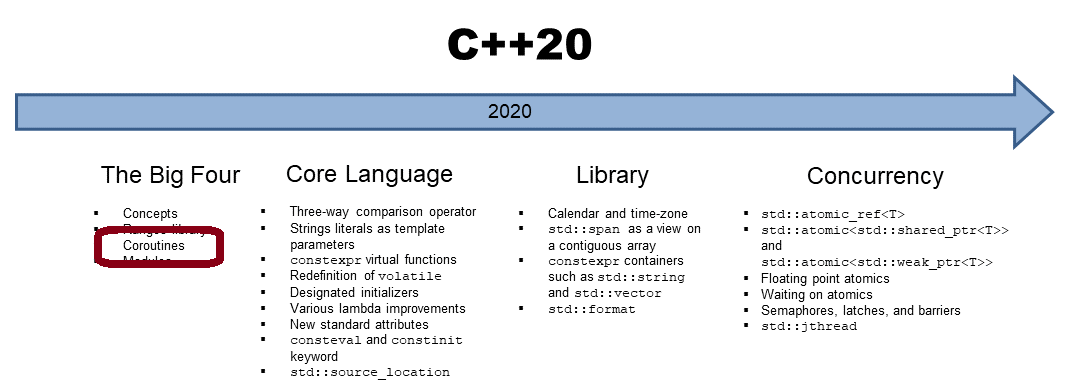
This is what happened so far in my pragmatical journey through the new coroutine keywords co_return, co_yield, and co_await.
co_return:
- Implementing Simple Futures With Coroutines
- Lazy Futures with Coroutines
- Executing a Future in a separate Thread with Coroutines
A Generator
As a starting point for further variations, I want to start with a generator which I only ask for three values. This simplification and visualization should help understand the generator’s control flow.
// infiniteDataStreamComments.cpp #include <coroutine> #include <memory> #include <iostream> template<typename T> struct Generator { struct promise_type; using handle_type = std::coroutine_handle<promise_type>; Generator(handle_type h): coro(h) { std::cout << " Generator::Generator" << '\n'; } handle_type coro; ~Generator() { std::cout << " Generator::~Generator" << '\n'; if ( coro ) coro.destroy(); } Generator(const Generator&) = delete; Generator& operator = (const Generator&) = delete; Generator(Generator&& oth): coro(oth.coro) { oth.coro = nullptr; } Generator& operator = (Generator&& oth) { coro = oth.coro; oth.coro = nullptr; return *this; } T getNextValue() { std::cout << " Generator::getNextValue" << '\n'; coro.resume(); // (13) return coro.promise().current_value; } struct promise_type { promise_type() { // (2) std::cout << " promise_type::promise_type" << '\n'; } ~promise_type() { std::cout << " promise_type::~promise_type" << '\n'; } std::suspend_always initial_suspend() { // (5) std::cout << " promise_type::initial_suspend" << '\n'; return {}; // (6) } std::suspend_always final_suspend() noexcept { std::cout << " promise_type::final_suspend" << '\n'; return {}; } auto get_return_object() { // (3) std::cout << " promise_type::get_return_object" << '\n'; return Generator{handle_type::from_promise(*this)}; // (4) } std::suspend_always yield_value(int value) { // (8) std::cout << " promise_type::yield_value" << '\n'; current_value = value; // (9) return {}; // (10) } void return_void() {} void unhandled_exception() { std::exit(1); } T current_value; }; }; Generator<int> getNext(int start = 10, int step = 10) { std::cout << " getNext: start" << '\n'; auto value = start; for (true) { // (11) std::cout << " getNext: before co_yield" << '\n'; co_yield value; // (7) std::cout << " getNext: after co_yield" << '\n'; value += step; } } int main() { auto gen = getNext(); // (1) for (int i = 0; i <= 2; ++i) { auto val = gen.getNextValue(); // (12) std::cout << "main: " << val << '\n'; // (14) } }
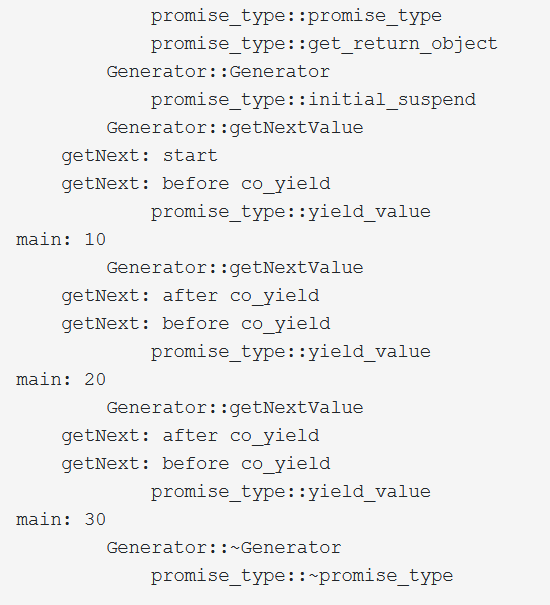
Let’s analyze the control flow.
The call getNext() (line 1) triggers the creation of the Generator<int>. First, promise_type (line 2) is created, and the following get_return_object call (line 3) creates the generator (line 4) and stores it in a local variable. The result of this call is returned to the caller when the coroutine is suspended the first time. The initial suspension happens immediately (line 5). Because the member function call initial_suspend returns an Awaitable std::suspend_always (line 6), the control flow continues with the coroutine getNext until the instruction co_yield value (line 7). This call is mapped to the call yield_value(int value) (line 8), and the current value is prepared current_value = value (line 9). The member function yield_value(int value) returns the Awaitable std::suspend_always (line 10). Consequently, the execution of the coroutine pauses, the control flow goes back to the main function, and the for loop starts (line 11). The call gen.getNextValue() (line 12) starts the execution of the coroutine by resuming the coroutine using coro.resume() (line 13). Further, the function getNextValue() returns the current value prepared using the previously invoked member function yield_value(int value) (line 8). Finally, the generated number is displayed in line 14 and the for loop continues. In the end, the generator and the promise are destroyed.
After this detailed analysis, I want first to modify the control flow.
 Modernes C++ Mentoring
Modernes C++ Mentoring
Do you want to stay informed: Subscribe.
Modifications
infiniteDataStreamComments.cpp. I only show the modifications.The Coroutine is Not Resumed
gen.getNextValue() in line 12) and the display of its value (line 14), the coroutine immediately pauses.int main() { auto gen = getNext(); for (int i = 0; i <= 2; ++i) { // auto val = gen.getNextValue(); // std::cout << "main: " << val << '\n'; } }
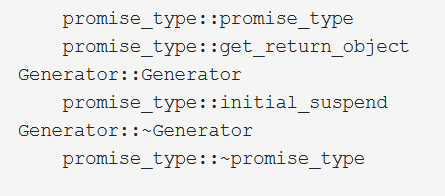
initial_suspend Never Suspends
In the program, the member function initial_suspend returns the Awaitable std::suspend_always (line 5). As its name suggests, the Awaitable std::suspends_always causes the coroutine to pause immediately. Let me return std::suspend_never instead of std::suspend_always.
std::suspend_never initial_suspend() { std::cout << " promise_type::initial_suspend" << '\n'; return {}; }
yield_value (line 8) is invoked. A subsequent call gen.getNextValue() (line 12) resumes the coroutine and triggers the execution of the member function yield_value once more. The start value 10 is ignored, and the coroutine returns 20, 30, and 40.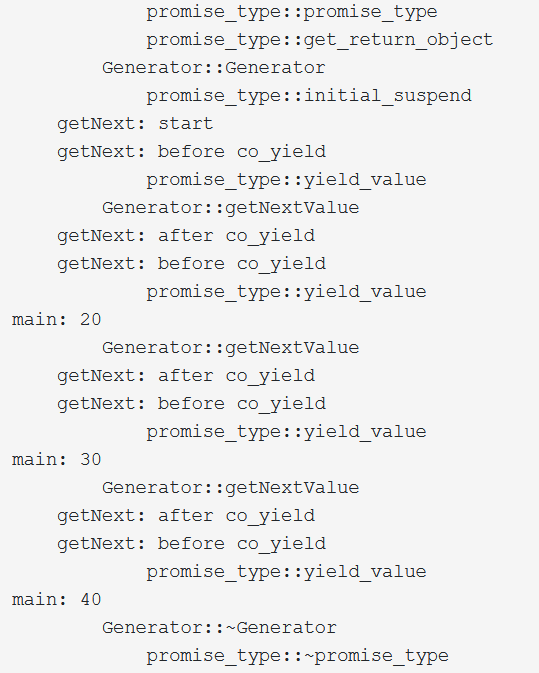
yield_value Never Suspends
co_yield value and prepares the current_value (line 9). The function returns the Awaitable std::suspend_always (line 10) and pauses the coroutine. Consequently, a subsequent call gen.getNextValue (line 12) has to resume the coroutine. When I change the return value of the member function yield_value to std::suspend_never, let me see what happens.std::suspend_never yield_value(int value) { std::cout << " promise_type::yield_value" << '\n'; current_value = value; return {}; }
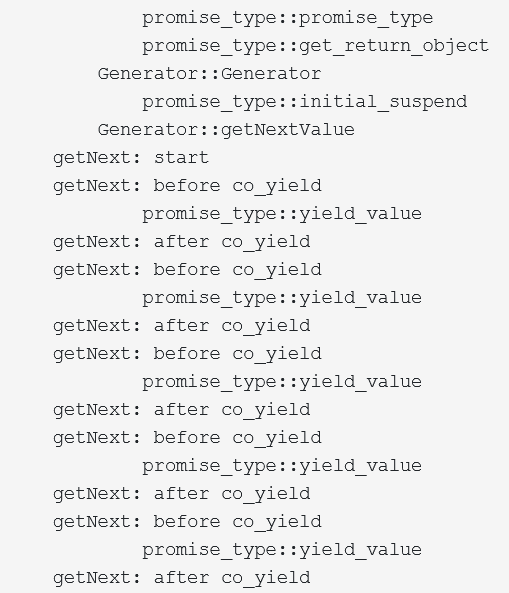
What’s next?
So far, I have never used the fact that the coroutine is a class template. In my next post, I restructure the generator to produce a finite number of arbitrary values.
Thanks a lot to my Patreon Supporters: Matt Braun, Roman Postanciuc, Tobias Zindl, G Prvulovic, Reinhold Dröge, Abernitzke, Frank Grimm, Sakib, Broeserl, António Pina, Sergey Agafyin, Андрей Бурмистров, Jake, GS, Lawton Shoemake, Jozo Leko, John Breland, Venkat Nandam, Jose Francisco, Douglas Tinkham, Kuchlong Kuchlong, Robert Blanch, Truels Wissneth, Mario Luoni, Friedrich Huber, lennonli, Pramod Tikare Muralidhara, Peter Ware, Daniel Hufschläger, Alessandro Pezzato, Bob Perry, Satish Vangipuram, Andi Ireland, Richard Ohnemus, Michael Dunsky, Leo Goodstadt, John Wiederhirn, Yacob Cohen-Arazi, Florian Tischler, Robin Furness, Michael Young, Holger Detering, Bernd Mühlhaus, Stephen Kelley, Kyle Dean, Tusar Palauri, Juan Dent, George Liao, Daniel Ceperley, Jon T Hess, Stephen Totten, Wolfgang Fütterer, Matthias Grün, Phillip Diekmann, Ben Atakora, Ann Shatoff, Rob North, Bhavith C Achar, Marco Parri Empoli, Philipp Lenk, Charles-Jianye Chen, Keith Jeffery, Matt Godbolt, Honey Sukesan, bruce_lee_wayne, Silviu Ardelean, and Seeker.
Thanks, in particular, to Jon Hess, Lakshman, Christian Wittenhorst, Sherhy Pyton, Dendi Suhubdy, Sudhakar Belagurusamy, Richard Sargeant, Rusty Fleming, John Nebel, Mipko, Alicja Kaminska, Slavko Radman, and David Poole.
| My special thanks to Embarcadero |  |
| My special thanks to PVS-Studio |  |
| My special thanks to Tipi.build |  |
| My special thanks to Take Up Code |  |
| My special thanks to SHAVEDYAKS |  |
Modernes C++ GmbH
Modernes C++ Mentoring (English)
Rainer Grimm
Yalovastraße 20
72108 Rottenburg
Mail: schulung@ModernesCpp.de
Mentoring: www.ModernesCpp.org


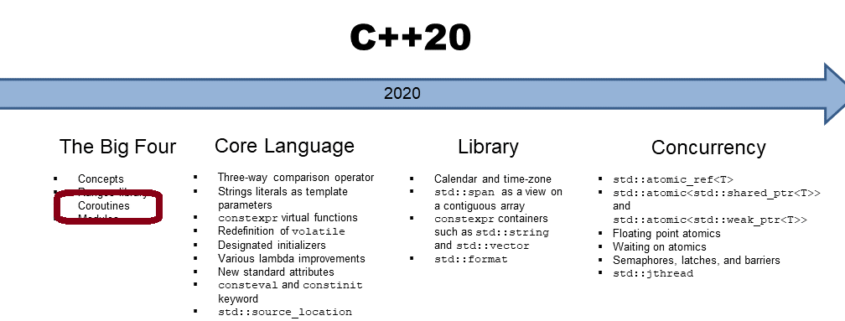
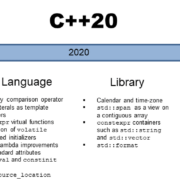
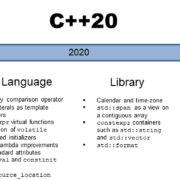
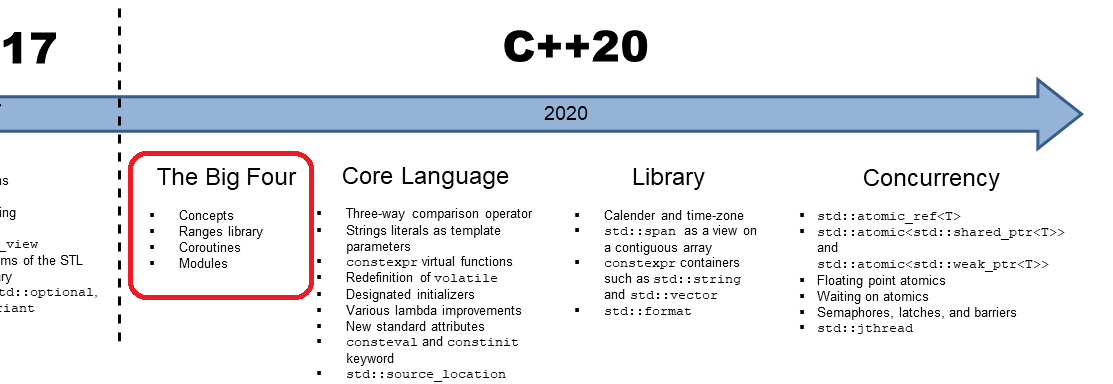

Leave a Reply
Want to join the discussion?Feel free to contribute!